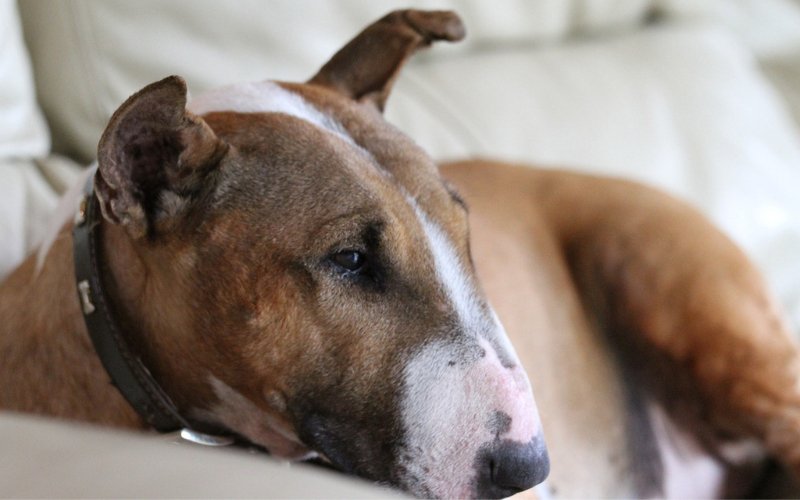
How to Stop Whining in Bull Terriers?
|
Time to read 5 min
|
Time to read 5 min
Image by Melanie Thomas from Pixabay
Bull Terriers, like any other dog breed, use various forms of vocalizations to communicate their needs, emotions, and to interact with their human companions. Bull Terrier whining is one such form of expression that may be quite frequent, leading to concerns among pet owners. In this guide, we delve deeper into this behavior, exploring the reasons behind it, strategies to manage it effectively, and insight into Bull Terrier obedience training that can help mitigate excessive whining.
When it comes to dog communication, the whining of a Bull Terrier is akin to a complex language, with different "words" for different situations. Whining can be attributed to a multitude of reasons, ranging from attention-seeking to expressing pain or discomfort. Understanding the subtleties of your Bull Terrier's whining is critical in determining the appropriate reaction and intervention.
Bull Terriers are known for their vivacious and energetic nature, and their vocalizations are no different. They may whine when they want something, such as food, a walk, or a favorite toy. They might also whine when seeking attention, especially when they feel left out or ignored.
Bull Terriers are a breed brimming with enthusiasm and energy. Consequently, whining might be a way for them to expend this energy or express excitement. Conversely, a Bull Terrier may also resort to whining when they're bored. This often manifests as a low, mournful whine, accompanied by a general lack of energy and enthusiasm.
If your Bull Terrier is whining excessively and seems to be in discomfort or pain, it's crucial to seek immediate veterinary attention. Whining may be a symptom of an underlying health issue that needs to be addressed promptly.
Whining can also be a Bull Terrier's response to stress or fear. This is often accompanied by other signs of anxiety, such as cowering, flattened ears, and a tucked tail. It's important to identify and eliminate the source of stress to alleviate such behavior.
Looking for the perfect way to pamper your beloved Bull Terrier? Look no further! Our Bull Terrier Printed Fleece Blanket is designed to provide ultimate warmth and comfort for your furry friend. Get ready to see your pup cozy up and melt your heart!
Bull Terrier puppies, like human infants, use whining as a primary form of communication. This is their way of expressing their needs and wants, whether it's for food, attention, or comfort. As they grow older and learn other means of communication, the frequency of whining usually decreases.
Understanding why your Bull Terrier is whining is the first step towards addressing this behavior. Here are some proactive strategies you can adopt to manage and reduce Bull Terrier whining effectively.
One of the most effective ways to manage Bull Terrier whining is by paying close attention to the nature of the whining and the accompanying behaviors. Over time, you may be able to distinguish between different types of whines and respond appropriately.
If the whining is due to stress or fear, approach your Bull Terrier gently and calmly. Harsh reactions can exacerbate the fear and stress, leading to increased whining or even aggression.
Once you've determined why your Bull Terrier is whining, you can address the root cause. If it's due to boredom, introduce new toys or engage in interactive games. If it's a physical discomfort, consider a veterinary check-up.
It's very important not to unintentionally reinforce the whining behavior. If your Bull Terrier learns that whining gets your attention or earns them a treat, they're likely to repeat this behavior. Instead, reward your Bull Terrier when they're calm and quiet.
Ensure your Bull Terrier has plenty of toys and gets ample exercise. A well-stimulated and physically active Bull Terrier is less likely to whine due to boredom or pent-up energy.
Designed to captivate and challenge your Bull Terrier, this Interactive Star Puzzle Toy is crafted with care to provide endless mental stimulation. Say goodbye to boredom and watch as your pup's problem-solving skills flourish with every interaction!
Training your Bull Terrier to obey commands is a beneficial strategy to control excessive whining. Bull Terrier obedience training, when done right, can help your pet understand that whining is not a desired behavior.
One of the most effective methods to control Bull Terrier noise is through positive reinforcement. Reward your Bull Terrier when they stop whining or are calm and quiet. This encourages them to repeat the desired behavior.
Did you know that finding a unique Bull Terrier plush toy that's safe for both children and pets can be quite a challenge?
We sympathize with the struggle of finding genuinely exceptional Bull Terrier-themed merchandise that stands out from the crowd. Allow our Bull Terrier Plush Toy to make a difference!
Training your Bull Terrier to understand and respond to a "quiet" command can be beneficial in managing whining. Start by saying "quiet" when your Bull Terrier is whining, and reward them with a treat or praise when they stop.
Consistency is crucial when it comes to Bull Terrier obedience training. Ensure all family members are on the same page regarding the training methods and responses to whining behavior, as mixed signals can confuse your Bull Terrier and hinder their progress.
If your Bull Terrier continues to whine excessively despite your best efforts, it might be time to consult a professional dog trainer or a veterinary behaviorist. They can provide specialized training strategies and medical interventions if necessary to manage the whining behavior.
Bull Terrier whining is a complex behavior that can be influenced by a multitude of factors. Understanding the reasons behind your Bull Terrier's whining is the first step towards managing it effectively. With patience, consistency, and the right training strategies, you can help your Bull Terrier communicate their needs and emotions in a less disruptive way, ensuring a harmonious coexistence.